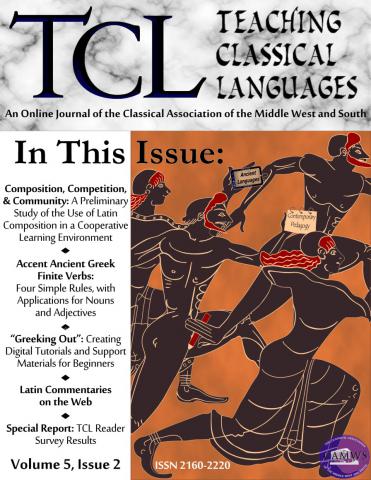Welcome to Teaching Classical Languages (TCL). TCL is the peer-reviewed, online journal dedicated to exploring how we teach (and how we learn) Greek and Latin. TCL is sponsored by the Classical Association of the Middle West and South (CAMWS).
Spring 2014

Abstracts of Articles
Composition, Competition, and Community: A Preliminary Study of the Use of Latin Composition in a Cooperative Learning Environment
This article presents a method for incorporating Latin composition into beginning or intermediate level Latin courses to increase students’ mastery of morphology, syntax, and vocabulary. This approach uses a semester-long team-based competition in a cooperative learning environment wherein students are accountable both for their own learning as well as that of their peers. Rather than inducing further anxiety into composition exercises, the element of competition proved to increase student preparation outside of class and engagement within the classroom. Two key elements of the method are the assigning of specific roles and tasks to each team member and reshuffling of team members. The end result was an engaged, respectful, and cooperative classroom community. Finally, this article presents the preliminary results of the first phase of a four-year study to test the effectiveness of this method
Accenting Ancient Greek Finite Verbs: Four Simple Rules, with Applications for Nouns and Adjectives
As Aristophanes of Byzantium and his successors do not transmit a simple method of accentuation, modern Classicists have had to deduce the principles through observation. This is not as easy as it sounds, for the seven major English textbooks for instructing elementary ancient Attic Greek have just as many explanations of accents. For years I have been using a simple method of accenting verbs that I devised, and I have never seen anything like it available in print or on the web. So, in the interest of keeping Greek accessible, here are the four Rules for accenting finite verbs. Apply them in order and you can accent all the verbs whose accents are not fixed.
“Greeking Out”: Creating Digital Tutorials and Support Materials for Beginners
The digital revolution has fundamentally changed how languages are taught. As the “digital presence” of ancient Greek continues to increase, instructors often find themselves faced with questions as to how best to use this technology to enrich their classrooms and to help their students. This article discusses our experience in creating screencasts (multimedia tutorial videos) for our beginning Greek classes. It is the goal of this article to encourage instructors of ancient Greek to explore methods for incorporating digital material into classes, as well as methods to create screencasts in particular using basic, readily available technology. In light of these aims, this article provides suggestion for resources on pedagogy, examples of several screencasts we produced, and a discussion of the procedures behind their filming. The article also touches on how we used these screencasts in our classes, and the relative success and failure of those approaches. There are also appendices on the “scripting” of the screencasts and on various components that could be used to produce screencasts.
Latin Commentaries on the Web
Two new classical commentary series, one designed for print and one for the web, show the advantages and limitations of different models of on-line publication. Open Book Publishers produces attractive, well-written print books, available on line in forms mimicking the style of the print editions. The Dickinson Classical Commentaries take full advantage of the web, not only including sound and pictures, but linking to other reference sources for geography, grammar, and images. This review discusses each series, in particular the commentaries on Vergil’s Aeneid from Open Book and on Caesar’s Gallic War from DCC.

